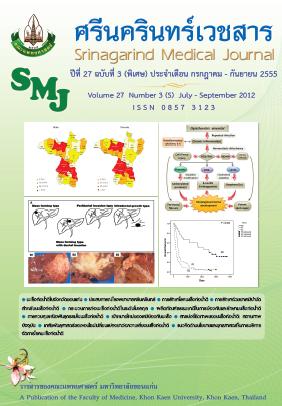Molecular Carcinogenesis of Cholangiocarcinoma I: Host-liver Fluke Interaction
Abstract
A major risk factor for cholangiocarcinoma (CCA) in
Northeastern of Thailand is opisthorchiasis caused by
Opisthorchis viverrini infection, which brings to chronic
inflammation. In this review we emphasize on host-parasite
interface causing chronic inflammation and its contributing
role to cholangiocarcinogenesis. Moreover, other
mechanisms that enhance CCA development are also
postulated. This review is based on animal and community
studies from the past to up-to-date. The evidences to
support this review are obtained not only from the publications
reported by The Liver Fluke and Cholangiocarcinoma
Research Center, Faculty of Medicine, Khon Kaen
University, Thailand but also from published data in CCA
worldwide.




